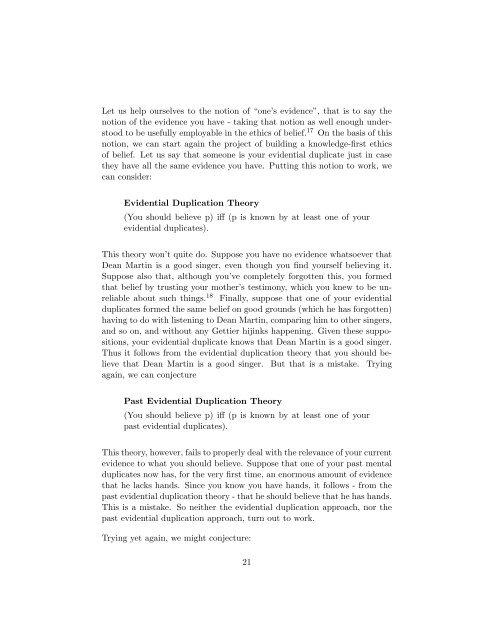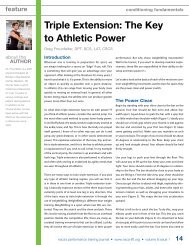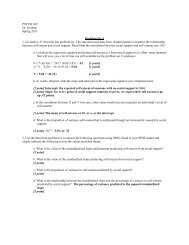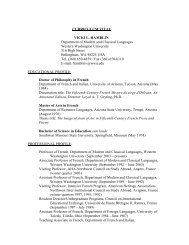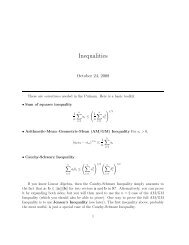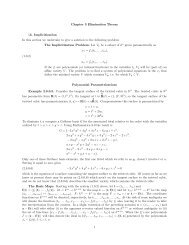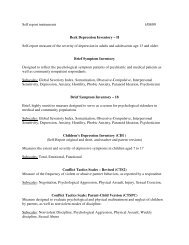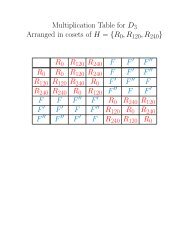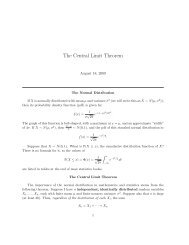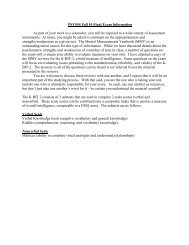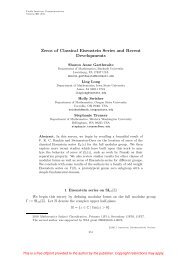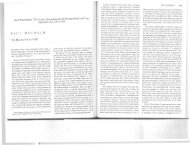Can There Be A Knowledge-First Ethics of Belief? - Western ...
Can There Be A Knowledge-First Ethics of Belief? - Western ...
Can There Be A Knowledge-First Ethics of Belief? - Western ...
You also want an ePaper? Increase the reach of your titles
YUMPU automatically turns print PDFs into web optimized ePapers that Google loves.
Let us help ourselves to the notion <strong>of</strong> “one’s evidence”, that is to say the<br />
notion <strong>of</strong> the evidence you have - taking that notion as well enough understood<br />
to be usefully employable in the ethics <strong>of</strong> belief. 17 On the basis <strong>of</strong> this<br />
notion, we can start again the project <strong>of</strong> building a knowledge-first ethics<br />
<strong>of</strong> belief. Let us say that someone is your evidential duplicate just in case<br />
they have all the same evidence you have. Putting this notion to work, we<br />
can consider:<br />
Evidential Duplication Theory<br />
(You should believe p) iff (p is known by at least one <strong>of</strong> your<br />
evidential duplicates).<br />
This theory won’t quite do. Suppose you have no evidence whatsoever that<br />
Dean Martin is a good singer, even though you find yourself believing it.<br />
Suppose also that, although you’ve completely forgotten this, you formed<br />
that belief by trusting your mother’s testimony, which you knew to be unreliable<br />
about such things. 18 Finally, suppose that one <strong>of</strong> your evidential<br />
duplicates formed the same belief on good grounds (which he has forgotten)<br />
having to do with listening to Dean Martin, comparing him to other singers,<br />
and so on, and without any Gettier hijinks happening. Given these suppositions,<br />
your evidential duplicate knows that Dean Martin is a good singer.<br />
Thus it follows from the evidential duplication theory that you should believe<br />
that Dean Martin is a good singer. But that is a mistake. Trying<br />
again, we can conjecture<br />
Past Evidential Duplication Theory<br />
(You should believe p) iff (p is known by at least one <strong>of</strong> your<br />
past evidential duplicates).<br />
This theory, however, fails to properly deal with the relevance <strong>of</strong> your current<br />
evidence to what you should believe. Suppose that one <strong>of</strong> your past mental<br />
duplicates now has, for the very first time, an enormous amount <strong>of</strong> evidence<br />
that he lacks hands. Since you know you have hands, it follows - from the<br />
past evidential duplication theory - that he should believe that he has hands.<br />
This is a mistake. So neither the evidential duplication approach, nor the<br />
past evidential duplication approach, turn out to work.<br />
Trying yet again, we might conjecture:<br />
21


